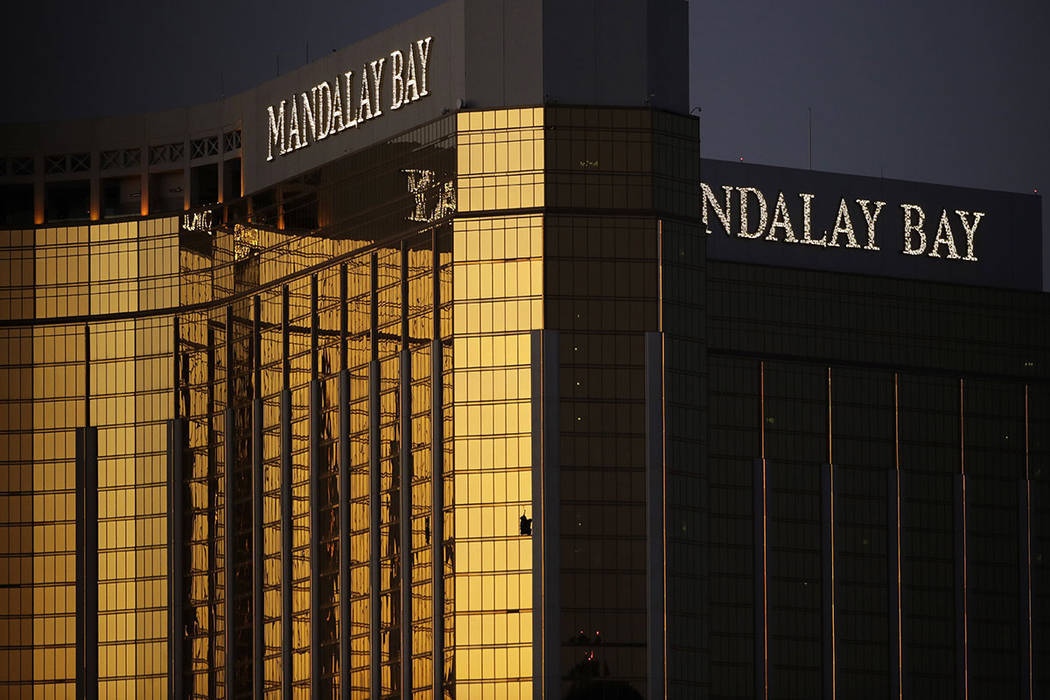Search warrant records offer insight into Las Vegas shooting investigation

Search warrant records obtained Tuesday by the Las Vegas Review-Journal offer a peek into the massive investigation that ensued in the first few hours and days after the Oct. 1 massacre.
The warrants detail many of the initial requests authorities made to gain more information on gunman Stephen Paddock. The investigation since has spanned at least three Nevada cities and involved both local and federal law enforcement agencies.
One of the first warrants came about five hours after the Route 91 Harvest festival shooting, which left 58 concertgoers dead and more than 500 injured.
In that warrant, a Metropolitan Police Department sergeant requested access to several items presumably located within Paddock’s Mandalay Bay corner suite as well as in his car, which was found parked on the second floor of the hotel’s valet parking garage, according to the documents.
The sergeant hoped to locate and collect the following:
—Any of Paddock’s identifying paperwork, including rent receipts, proof of insurance and Department of Motor Vehicles registration records.
—Any writings that potentially documented active shooter plans.
—Any photographs, video or audio, as well as DVDs, CDs, cellphones, computers, tablets and gaming consoles.
—Paddock’s phone records, including call history, voicemails and contacts.
—A “thorough, microscopic examination and documentation” of the crime scene, including “fingerprints, blood, hair, fibers and bodily fluid samples.”
—Any of Paddock’s clothing — worn or unworn — as well as his bags or backpacks.
—Any and all firearms, including “handguns, shotguns and rifles,” spent or live ammunition, firearm cleaning materials and any paperwork documenting the ownership of those firearms.
The last request on that warrant: Paddock’s body.
A document detailing the findings of that search was not released to the Review-Journal.
Subsequent search warrants filed in the days after the shooting requested access to Paddock’s email account, internet search history and download history, as well as access to some of Marilou Danley’s phone records. Danley was Paddock’s girlfriend.
In a search warrant filed Oct. 9, investigators asked for permission to collect bullets and bullet fragments that had been lodged in the walls, pictures and paintings of the Mandalay Bay’s 32nd floor, presumably from when Paddock fired down the hallway, striking security guard Jesus Campos.
Another warrant document, obtained Monday out of Mesquite, requested any and all of Paddock’s medical records specific to Mesa View Hospital in Mesquite. The warrant cited an anonymous tip that Paddock had self-admitted to the hospital for a psychiatric evaluation, but the search revealed no such records.
Many other police records — including additional warrant documents and 911 recordings — remain sealed by the court. The Review-Journal and several other media organizations are suing for their release.
A hearing on the case is scheduled for Jan. 16, about two months after the media organizations originally filed suit.
The case was to be heard Dec. 7, but it was rescheduled after Metropolitan Police Department lawyers filed a challenge that removed the case’s original judge, District Judge Jim Crockett, without reason. The case was then reassigned to District Judge Elissa Cadish, who on Tuesday decided to hear the case in January.
Contact Rachel Crosby at rcrosby@reviewjournal.com or 702-477-8301. Follow @rachelacrosby on Twitter.